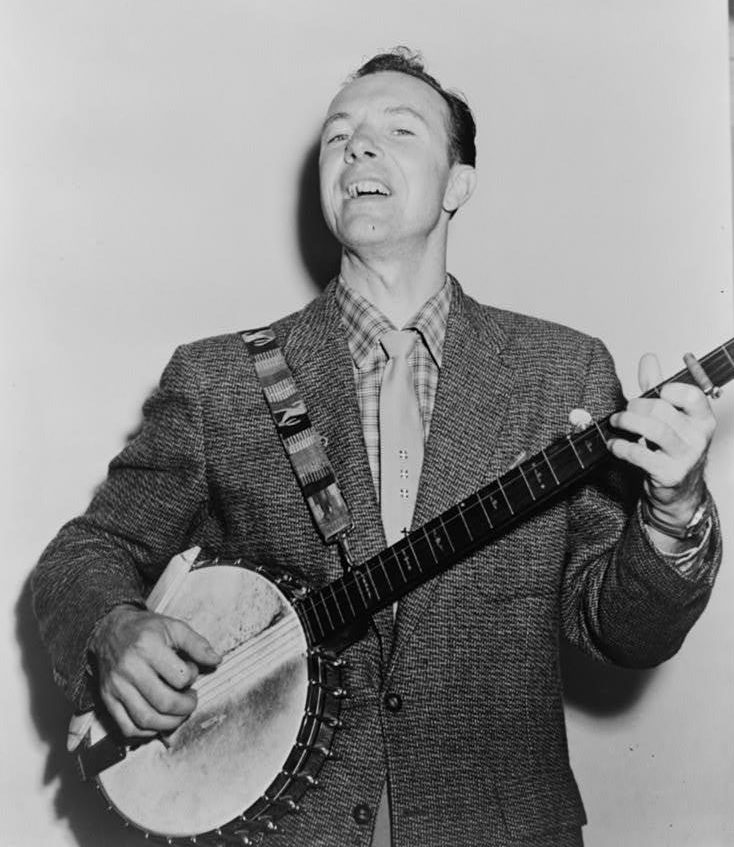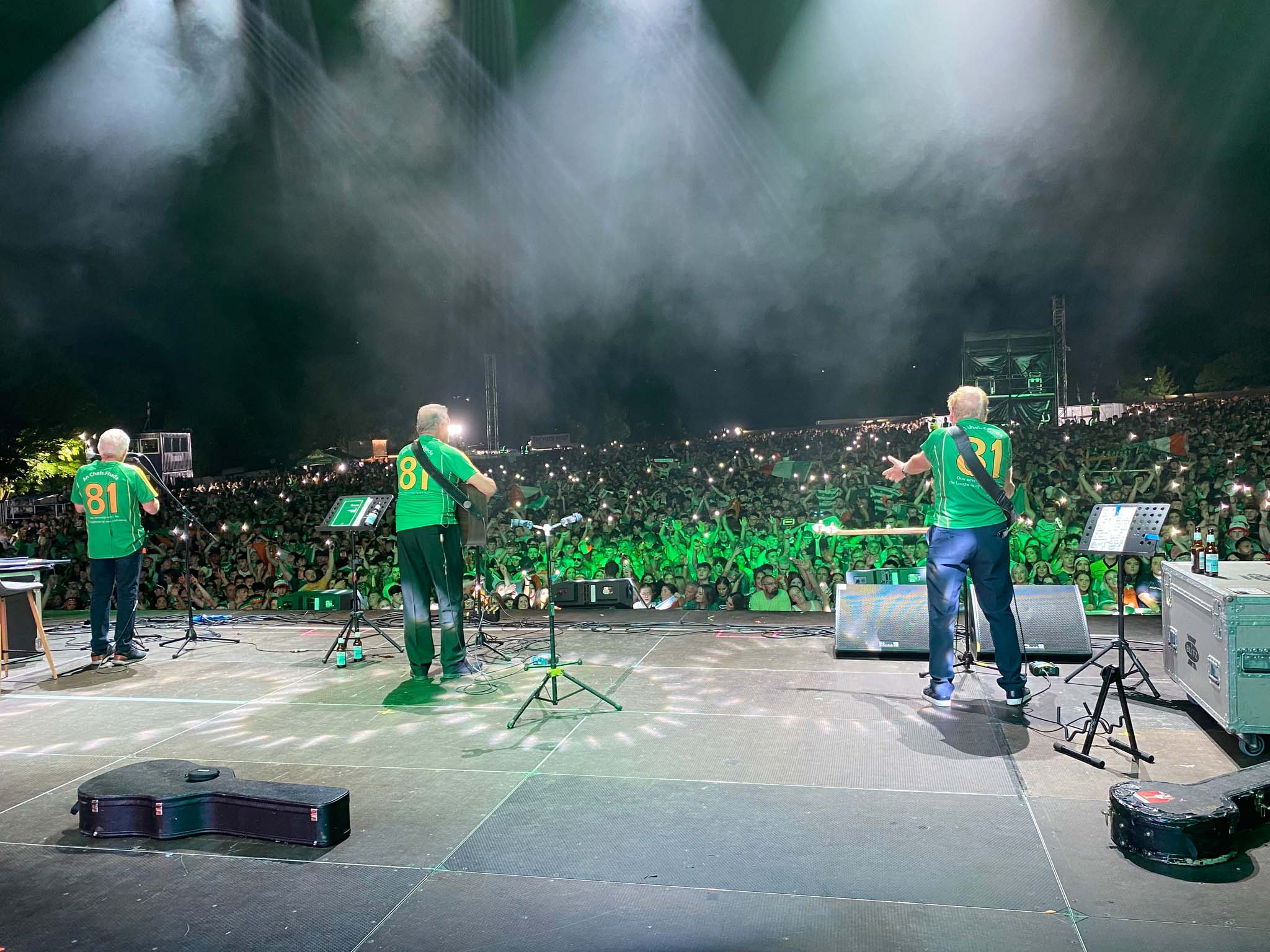- Music
- 25 Aug 23

With major live dates lined up for the rest of the year – including their first ever Electric Picnic slot – The Wolfe Tones’ Brian Warfield discusses Pete Seeger, the media, the women’s football team, and more.
Within Irish music, The Wolfe Tones have always been a bit of an anomaly. Few, if any, other acts who have been active since the early ‘60s can say that they’re still finding major chart success, clocking up millions of Spotify streams, selling out big-capacity concerts in record time, building up an impressive TikTok fanbase, and are about to play one of most buzzed-about sets at this year’s Electric Picnic.
“We’re no boyband anymore... but funnily enough, we’ve never lost the young generations over the years,” The Wolfe Tones’ Brian Warfield reflects, speaking to me from his holidays in Florida, while his grandchildren are occupied at Disney World. “When we started off in the early ‘60s, obviously we had the young generation, but every young generation came along after.”
Of course, all of their success and honours have occurred alongside controversies, bans, and scathing opinion pieces about the nature of their lyrics, which have been accused of ‘glorifying the IRA.’
Still, The Wolfe Tones – also made up of Noel Nagel and Tommy Byrne – have tapped naturally into the anti-establishment, anti-imperialist, and pro-united Ireland spirit being championed today by hugely popular contemporary acts like KNEECAP and The Mary Wallopers. Clearly, their stance has resonated with a generation of young Irish people whose understanding of their country’s history is less directly intertwined with the immediate trauma, media censorship, and collusion of their parents’ era.
“They see in The Wolfe Tones a group that were not scared to support the people of the Six Counties in the long struggle,” Brian says of their fanbase. “There was very little support coming from anywhere. I thought that telling their story to the world, in song, would help them get recognition for what they were going through.”
Advertisement
Those songs included stories of hunger strikers (‘Joe McDonnell’), infamous miscarriages of justice (‘The Guildford 4), and British state violence (‘Plastic Bullets’) – as well as celebrations of notable Protestant nationalists (‘Protestant Men’).
While their critics accused them of pushing a political agenda, Brian felt they were stepping into the role of “the voice of the people who were silenced.”
“We had no political agenda, as such,” he asserts. “I was never a member of any political party, and never would join a political party. I’m an Irishman, and I’m proud to be an Irishman. It hurts me when Ireland hurts, and I’m happy when Ireland’s happy.”
Much of his worldview, he tells me, has been informed by growing up in Inchicore.
“We probably never got much of a chance there – it was all working class,” he recalls. “We never got opportunities to go onto further education. We were destined for the emigration ship, you might say. That’s the way it was in Inchicore and many other places and suburbs around Dublin.
“All our No.1 hits over the years have been reflecting what happened in Ireland – whether it was emigration, the lack of employment in our country in the ‘80s, or the Troubles. We’re a people's group. I’m not singing to get accolades from academics. I’m just singing for the people of Ireland, because they understand what we’re singing about more than anyone else.”
Advertisement
There’s also international influences behind the group’s approach, including American folk singer and activist Pete Seeger.
“What a guy!” Brian enthuses. “I had the honour of standing on stage with him with the Young Folk Song Society back in the early ‘60s. He performed in Dublin, and he wanted some people to sing the choruses with him. And of course we knew the choruses of a lot of his songs, so we sang along.
“I never saw a greater performer,” he adds. “And he was a great influence. He was playing the banjo, and afterwards I said, ‘I’m going to play the banjo!’ I’ve tried my best to emulate him, and that reputation he had for performing and for justice – giving a voice to the underdog.”

Pete Seeger in 1955. Credit: Fred Palumbo
Brian also points out that both Pete Seeger and The Wolfe Tones had to contend with blacklistings and censorship – and in the Irish group’s case, he feels it’s far from ancient history.
“Conor Cruise O’Brien outlawed all republican or ‘green’ music on radio,” Brian says of the ‘73-’77 Minister for Posts and Telegraphs. “We were part of that. I think he said at the time, ‘We don’t want to hear Wolfe Tones-type songs on the radio.’ That was the beginning of the ban on The Wolfe Tones, which has lasted on to the present day.”
Advertisement
While RTÉ have claimed that The Wolfe Tones’ music isn’t banned, Brian isn’t convinced.
“If you looked back at the radio plays over the last two months, you’d find it very difficult to find one Wolfe Tones’ song!” he laughs. “That says something! My voice has been heard about that over the years. Am I banging my head off the wall? I think I am! But there is a wrong there.”
He tells me that ‘The Guildford 4’, from the 1987 album Sing Out For Ireland, wasn’t welcome on the Irish airwaves at the time either – as it was released before the convictions for the Guildford pub bombings were reversed.
“Our manager then, Oliver Barry, wanted to get it on The Late Late Show,” Brian reflects. “But Gay Byrne said, ‘We don’t want another song about terrorists!’ A few weeks later, they were released, and Gay Byrne was fighting to have them on the show!”
More recently, The Wolfe Tones found themselves immersed in drama once again, when the Irish women’s football team were videoed singing Brian’s 1989 composition, ‘Celtic Symphony’, after qualifying for the World Cup. Its “ooh ah, up the ‘RA” chorus, he maintains, was inspired by graffiti he saw on a visit to Glasgow, and, as such, tells the “story of the Irish diaspora.”
“The girls were only singing the song, and it’s a harmless song,” Brain asserts. “It’s sung all over the country. It’s a good song – it wouldn’t be sung if it wasn’t!”
Advertisement
“The way they were treated was desperate,” he says of the Irish players. “Like sending them out to do press interviews, when the FAI should have been doing it themselves. They were thrown to the wolves. It should have never happened. These girls had achieved something remarkable. I was cheering like mad for them here!”

Brian’s also buzzing for The Wolfe Tones to make their Electric Picnic debut.
“I was delighted when we were asked to do it, because we’ve seen it go on for years and years,” he smiles. “It’s a very popular platform for people, so it was like, ‘We’ve made it! We’ve made it to Electric Picnic!’
“The only challenge is that we normally do a two-and-a-half hour show – and we’re down to one hour at Electric Picnic,” he continues. “So we have to try and fit as many songs as we can into that period of time!”
Even on his holidays, Brian admits that “the brain is constantly moving” and “constantly thinking of new ideas.”
“At the moment, I’m trying to write a book,” he reveals. “I’ve probably 170 songs that did see the light of day, so I’m going to tell stories behind the songs.
Advertisement
“The years go by so fast, it’s unbelievable,” he adds. “We’re very privileged to have been able to do this for 60 years.”
The Wolfe Tones play Electric Picnic on Sunday, September 3. See more of their upcoming tour dates – including 3Olympia Theatre, Dublin on October 22 & November 3 – at wolfetonesofficialsite.com
Read the full, extensive Electric Picnic special feature in the current issue of Hot Press:









